“quand le soleil est couché, toutes bestes sont à l’umbre.” seigneur de humevesne (rabelais)

New at IWP Books: Things as They Are: Essays by Albert Jay Nock.
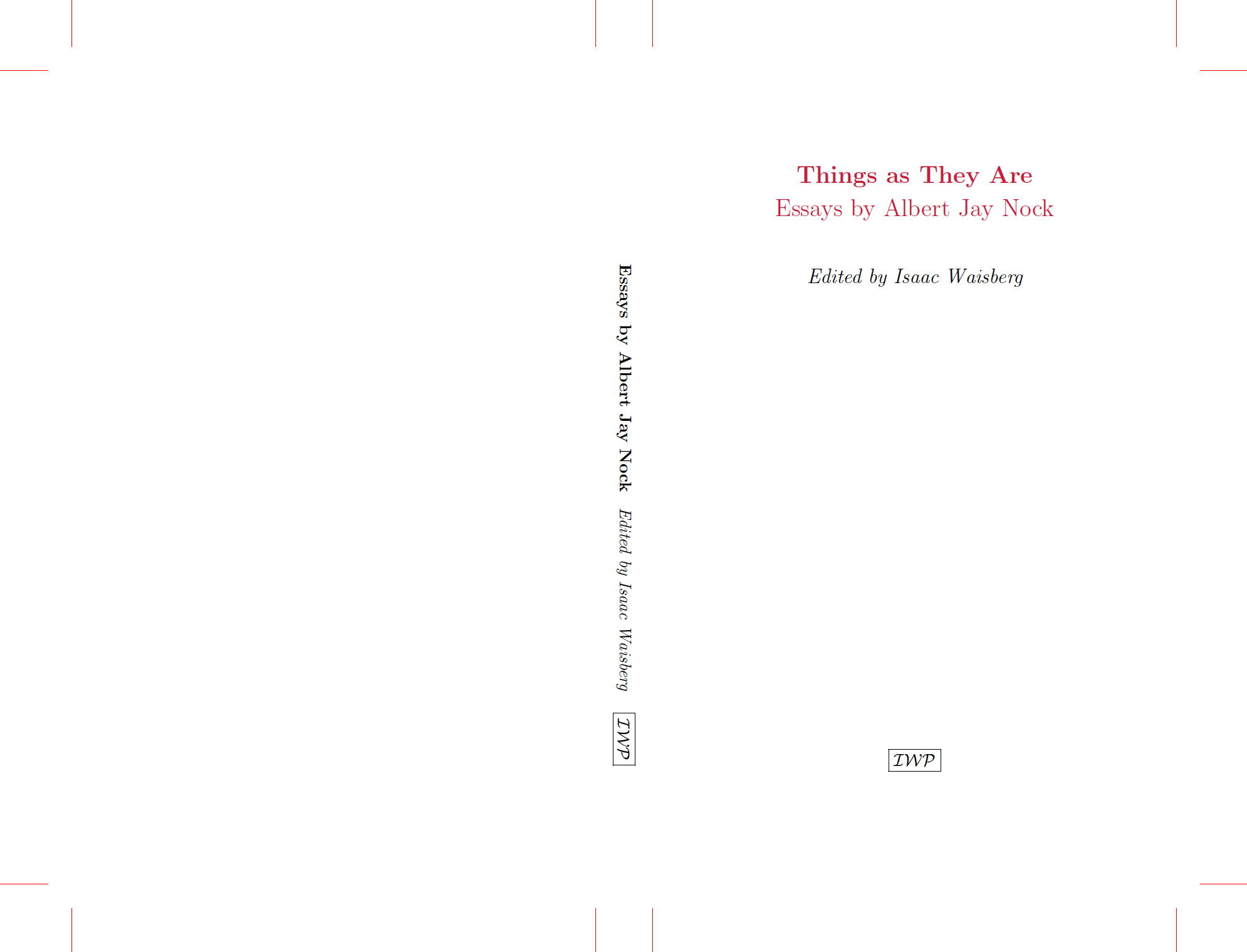
New at IWP Books: Two Essays by Ahad Ha-Am.

Jacques Barzun on The Relation of the State to Industrial Action & Economics and Jurisprudence by Henry C. Adams, edited by Joseph Dorfman (American Panorama, 1967):
The Adams who wrote this book is not related to the Adams family represented in the preceding book or the one which follows it on this shelf of American books… He is, by comparison, relatively unknown, though his mind and work were original and the influence of his pioneering thought has been increasingly recognized.
The introduction by Professor Joseph Dorfman, himself a noted historian of economic thought, makes plain the circumstances in which Henry C. Adams (1851–1921) worked when he directed the statistical work of the Interstate Commerce Commission, the first agency designed to curb the powerful American railroads’ anarchical practices and disregard of the public interest.
In reflecting on the acts of the two great powers of modern times – the state and big business – Adams was led to formulate the first searching theory of their permanent and desirable relation. The fact that he was a liberal in the finest tradition lends special importance to his views, for it was the liberal swing away from total laisser-faire toward the end of the nineteenth century which produced the network of restraining laws and practices now in force throughout the free world. It rejects a thoroughgoing socialization, which would merge the power of the state and that of big business, believing that this merger multiplies the power of each by infinity; and it acknowledges at the same time that a complete hands-off policy is neither possible in fact nor defensible in theory. Adams’s formulation of the equilibrium to be sought has thus the importance of both a fundamental charter and a prolegomenon to future speculation in these fields…
The Relation of the State to Industrial Action by Henry C. Adams is available at IWP Books.
New at IWP Books: The Relation of the State to Industrial Action (1887) by Henry C. Adams.
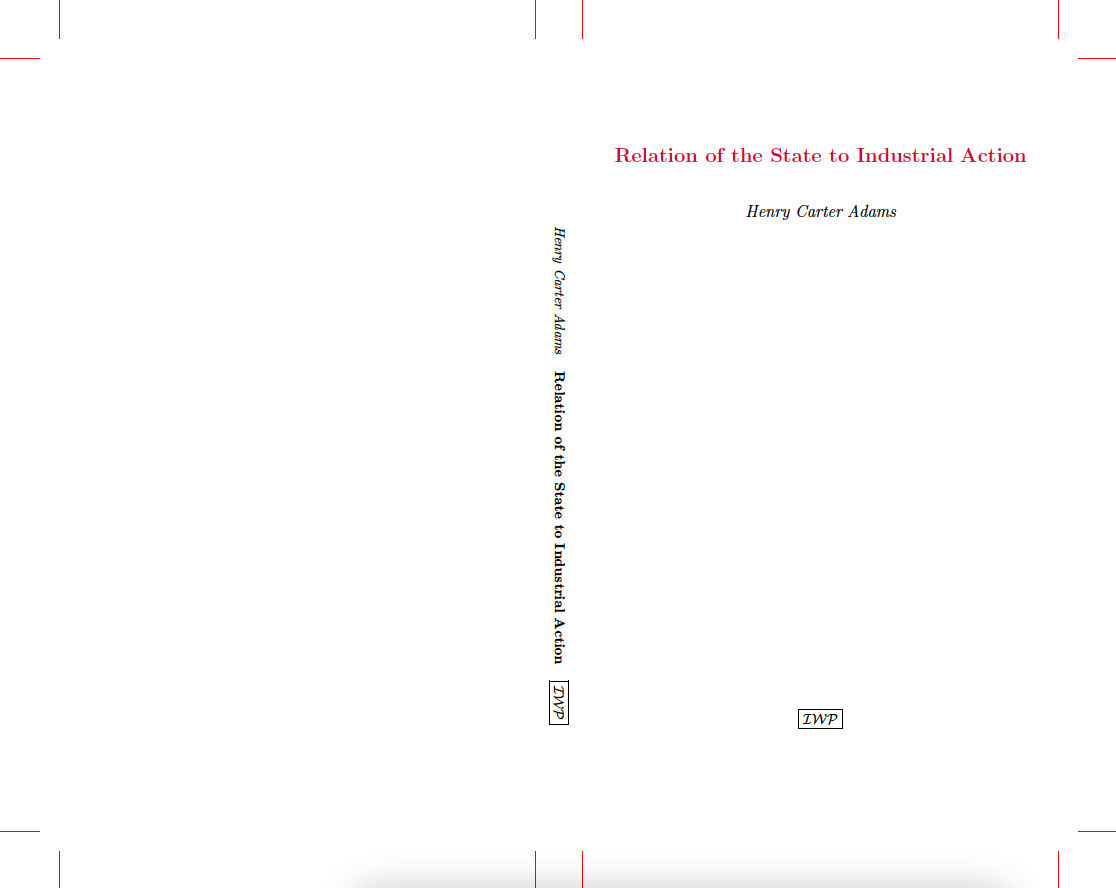
Jacques Barzun’s Review of Peter F. Drucker’s The Future of Industrial Man.
New at IWP Books: The Future of Industrial Man (1942) by Peter F. Drucker.


New at IWP Books: Ends and Means (1937) by Aldous Huxley.

“Self-transcendence is through self-consciousness. A human being who spends most of his waking life either day-dreaming, or in a state of mental dissipation, or else identifying himself with whatever he happens to be sensing, feeling, thinking or doing at the moment, cannot claim to be fully a person.” Aldous Huxley, 1937, Ends and Means
From Aldous Huxley’s (1937) Ends and Means (Soon at IWP Books):
Nevertheless, artistic creation and scientific research may be, and constantly are, used as devices for escaping from the responsibilities of life. They are proclaimed to be ends absolutely good in themselves – ends so admirable that those who pursue them are excused from bothering about anything else. This is particularly true of contemporary science. The mass of accumulated knowledge is so great that it is now impossible for any individual to have a thorough grasp of more than one small field of study. Meanwhile, no attempt is made to produce a comprehensive synthesis of the general results of scientific research. Our universities possess no chair of synthesis. All endowments, moreover, go to special subjects – and almost always to subjects which have no need of further endowment, such as physics, chemistry and mechanics. In our institutions of higher learning about ten times as much is spent on the natural sciences as on the sciences of man. All our efforts are directed, as usual, to producing improved means to unimproved ends. Meanwhile intensive specialization tends to reduce each branch of science to a condition almost approaching meaninglessness. There are many men of science who are actually proud of this state of things. Specialized meaninglessness has come to be regarded, in certain circles, as a kind of hall-mark of true science. Those who attempt to relate the small particular results of specialization with human life as a whole and its relation to the universe at large are accused of being bad scientists, charlatans, self-advertisers. The people who make such accusations do so, of course, because they do not wish to take any responsibility for anything, but merely to retire to their cloistered laboratories, and there amuse themselves by performing delightfully interesting researches. Science and art are only too often a superior kind of dope, possessing this advantage over booze and morphia: that they can be indulged in with a good conscience and with the conviction that, in the process of indulging, one is leading the ‘higher life.' Up to a point, of course, this is true. The life of the scientist or the artist is a higher life. Unfortunately, when led in an irresponsible, one-sided way, the higher life is probably more harmful for the individual than the lower life of the average sensual man and certainly, in the case of the scientist, much worse for society at large.
From Aldous Huxley’s (1937) Ends and Means (Soon at IWP Books):
In the democratic countries, intelligence is still free to ask whatever questions it chooses. This freedom, it is almost certain, will not survive another war. Educationists should therefore do all they can, while there is yet time, to build up in the minds of their charges a habit of resistance to suggestion. If such resistance is not built up, the men and women of the next generation will be at the mercy of any skilful propagandist who contrives to seize the instruments of information and persuasion. Resistance to suggestion can be built up in two ways. First, children can be taught to rely on their own internal resources and not to depend on incessant stimulation from without. This is doubly important. Reliance on external stimulation is bad for the character. Moreover, such stimulation is the stuff with which propagandists bait their hooks, the jam in which dictators conceal their ideological pills. An individual who relies on external stimulations thereby exposes himself to the full force of whatever propaganda is being made in his neighbourhood. For a majority of people in the West, purposeless reading, purposeless listening-in, purposeless looking at films have become addictions, psychological equivalents of alcoholism and morphinism. Things have come to such a pitch that there are many millions of men and women who suffer real distress if they are cut off for a few days or even a few hours from newspapers, radio music, moving pictures. Like the addict to a drug, they have to indulge their vice, not because the indulgence gives them any active pleasure, but because, unless they indulge, they feel painfully subnormal and incomplete. Without papers, films and wireless they live a diminished existence; they are fully themselves only when bathing in sports news and murder trials, in radio music and talk, in the vicarious terrors, triumphs and eroticisms of the films. Even by intelligent people, it is now taken for granted that such psychological addictions are inevitable and even desirable, that there is nothing to be alarmed at in the fact that the majority of civilized men and women are now incapable of living on their own spiritual resources, but have become abjectly dependent on incessant stimulation from without. Recently, for example, I read a little book in which an eminent American biologist gives his view about the Future. Science, he prophesies, will enormously increase human happiness and intelligence – will do so, among other ways, by providing people with micro-cinematographs which they can slip on like spectacles whenever they are bored. Science will also, no doubt, be able very soon to supply us with micro-pocket-flasks and micro-hypodermic-syringes, micro-alcohol, micro-cigarettes and micro-cocaine. Long live science!
W. H. Auden was nominated 19 times for the Nobel Prize in Literature, in 1966 by Lionel Trilling. Aldous Huxley was nominated 9 times, in 1961 by Jacques Barzun.
New at IWP Books: The End of Economic Man (1939) by Peter Drucker.
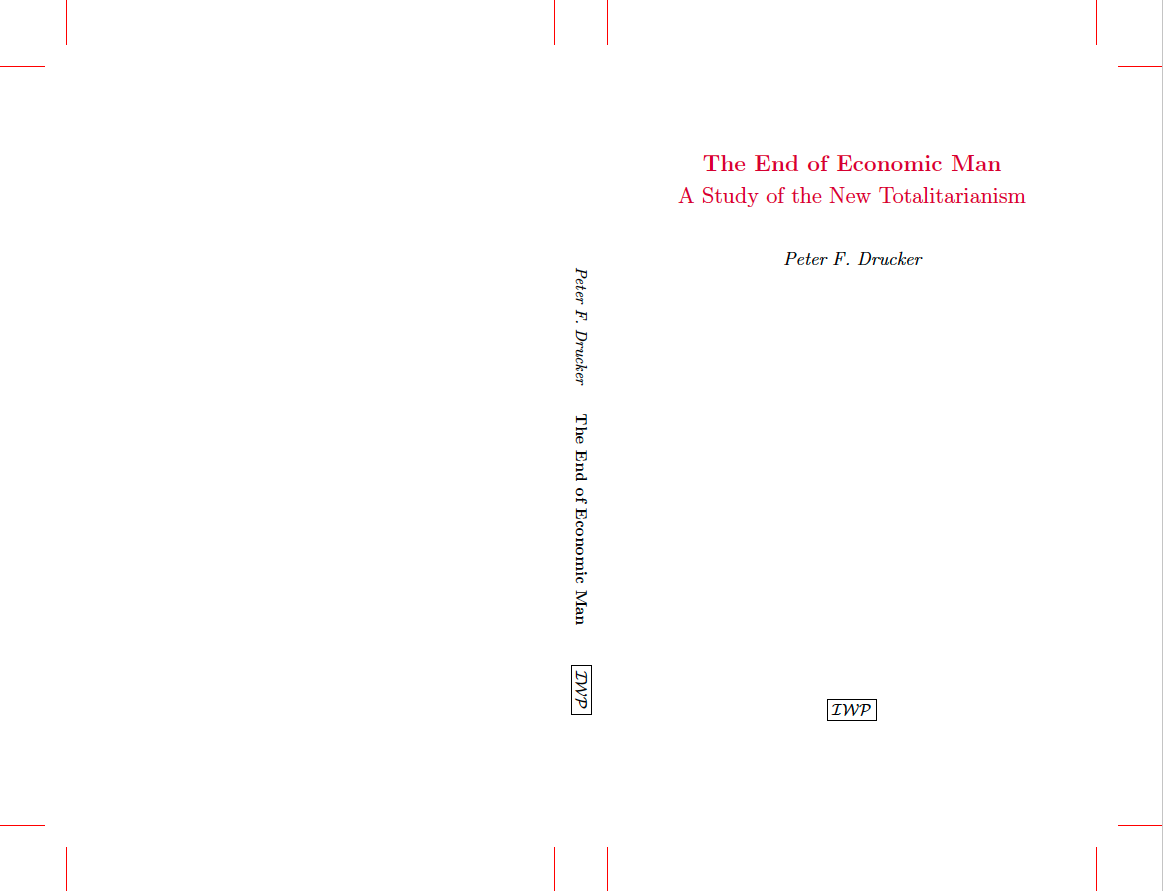
New Issue of Comment Magazine, on Charting Social Change.
Theodore Dalrymple on Lying to Ourseleves.
One of the peculiarities of our age is the ferocity with which intellectuals and politicians defend propositions that they do not—because they cannot—believe to be true, so outrageous are they, such violence do they do to the most obvious and evident truth. Agatha Christie (a far greater psychologist than Sigmund Freud), drew attention almost a century ago to the phenomenon when she had Dr. Sheppard, the protagonist and culprit of The Murder of Roger Ackroyd say, “It is odd how, when you have a secret belief of your own which you do not wish to acknowledge, the voicing of it by someone else will rouse you to a fury of denial. I burst immediately into indignant speech.”
Dorothy Sayers on The End of Economic Man by Peter Drucker:
A rather difficult book, that needs and deserves to be read attentively – turn off the Wireless Announcer before getting down to it – but it is the most interesting and original book I have read recently. It deals with the failure of the economic state to provide man with a satisfactory and reasonable world to live in. Incidentally, it offers a really intelligible explanation of that very puzzling thing, the working of totalitarian economics.
Soon at IWP Books: The End of Economic Man (1939) by Peter F. Drucker.
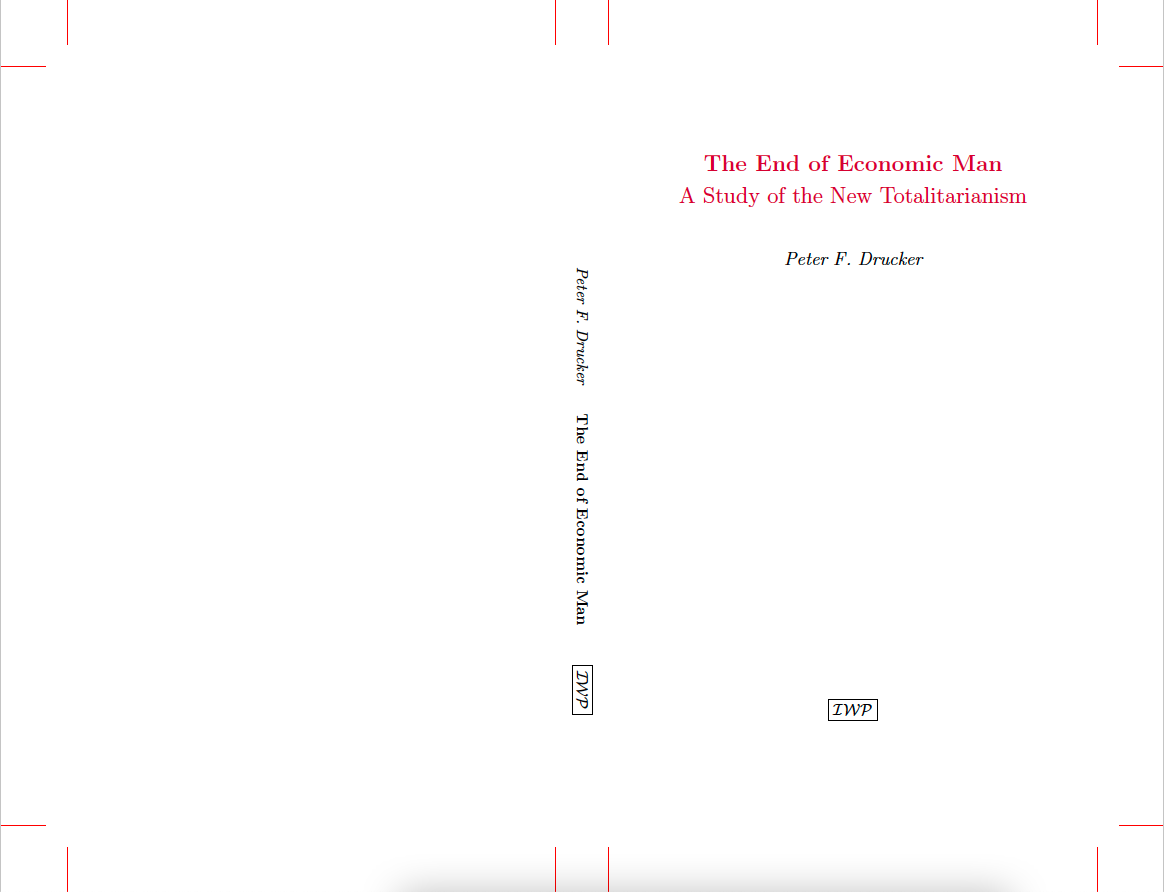

Ordered: The Man Born to Be King by Dorothy L. Sayers 📚
From Begin Here: A War-Time Essay (1940) by Dorothy L. Sayers.
In times like the present, when we see the principles we have acknowledged attacked, and their foundations undermined; when doubts about the rationality and purpose of the universe have been sown in our minds; when we are led to see ourselves more and more as the helpless puppets of world-processes which we do not understand; and when we are in addition fatigued and harassed by constant wars and upheavals, we are desperately tempted to try and call a halt to the march of events. “Give us stability!” we cry; “we do not want this perpetual change and disturbance; we want stability.”
But there are two kinds of stability. The spinning top is stable so long as it keeps moving; when it stops, it falls into inertia. Let us face the facts courageously. Unless the democracies keep moving, and unless they can preserve the vital balance of all their principles, they will become inert and useless, and will be swept up and carted away by the next moving thing that comes along. We are like a man riding a bicycle on a tight-rope across the Niagara Falls: we cannot go back, we dare not stop, we must go forward and keep our balance if we are not to fall to destruction.
That being so (and we shall probably feel better if we once accept the situation and resolve to deal with it energetically), it may be helpful to look once again at the various conceptions of man as shown to us by historical development and see whether we cannot form some plan for knitting them up again into that Whole Man who is the full expression of each and every one of us. The new Whole Man will be, or ought to be, an advance upon the original conception of him, because we now know more about the various aspects of him than we did in the Middle Ages. It was doubtless a good thing that we should thus, as it were, take him to pieces and have a look at the works, but the time has now come, I think, for putting the pieces together, with any improvements that our new knowledge may suggest. This is, indeed, a perfectly scientific way of proceeding: from synthesis to analysis, and from analysis to a new synthesis – so we need not feel that there is anything unpractical or mysterious or “idealistic” about it.
New at IWP Books: Begin Here: A War-Time Essay (1940) by Dorothy L. Sayers.
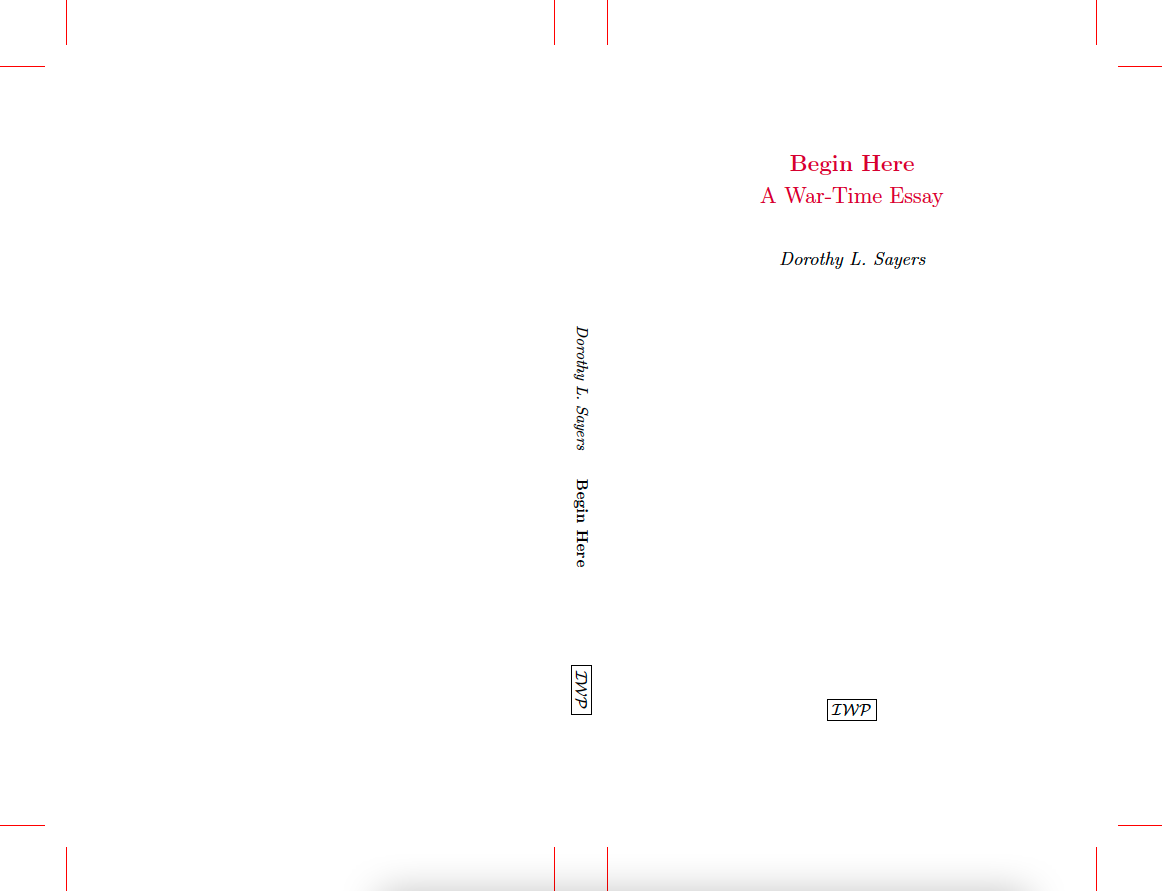

Are Women Human? (1938) by Dorothy L. Sayers at IWP Articles.